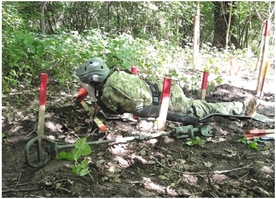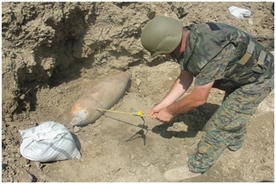Building capacity to clear unexploded ordnance in Georgia
Following the 2008 war between Georgia and Russia, Georgia faced the task of rebuilding affected areas of the country. On top of the reconstruction efforts, Georgia faced an additional problem: legacy minefields and extensive unexploded ordnance contamination. In response to this, Georgia turned to NATO for help. At the government’s request, NATO designed and funded a project focused on strengthening the Georgian Army’s Explosive Ordnance Disposal (EOD) Company.

“This project provided Georgia with the military capability to clear legacy minefields and free land contaminated by hazardous ammunition left over from previous conflicts, thus contributing to the creation of a safer environment and more economic opportunities for the local population,” said David Towndrow, NATO Support Agency (NSPA) Project Manager. As with similar types of Trust Fund projects, NSPA was the Executing Agent for the project in Georgia.
Increasing the skills of the Georgian EOD Company

In March 2011, 66 members of the EOD Company started a series of basic and specialised training de-mining and explosive ordnance disposal courses in Georgia and at the Azerbaijan National Agency for Mine Action’s (ANAMA) regional training centre in Goygol.
“The Georgia project provided basic, as well as specialist, courses and practical training. We believe that after the intensive training the EOD Company is fully prepared to take the responsibility for coping with existing explosive remnants of war threats,” said Elnur Gasimov, Head of ANAMA’s Training, Survey and Quality Assurance Division.
In addition to the intensive training courses, the Trust Fund project provided Georgia with over €600 000 worth of de-mining equipment, including personal protective equipment, mine detectors, de-mining tool kits, three minibuses and three all-terrain vehicles, which give the Company the capability to deploy to EOD tasks as an independent unit.
After completing their training, the participants spent six months taking part in a mentoring programme in Georgia. During this phase of the programme, the EOD Company had the opportunity to put their recently acquired skills and equipment to use, carrying out clearance operations at two sites designated by the Georgia Ministry of Defence.
“The new skills provided by the NATO project successfully build on our own extensive experience in EOD,” said Senior Lieutenant Mikheil Katsiashvili, Acting Commander of the EOD Company.
Improving medical rehabilitation facilities

A separate, but related, aspect of the NATO-funded project focused on building up Georgia’s medical rehabilitation capacity. Gori Military Hospital received €80 000 worth of medical equipment, paid for from the Trust Fund. The additional equipment helps the hospital’s physiotherapy department enhance its ability to treat military personnel and civilian wounded by explosive remnants of war.
“With the installation of the new, advanced equipment, we can now provide a wide range of services, like movement therapy, medical massages and hydrotherapy to patients with various types of injuries or traumas,” said Dr Nino Kervalishvili, the head of the physiotherapy department.
Successful cooperation between partners
The lead nations for this NATO Trust Fund project were the Czech Republic, Lithuania and Estonia. Fourteen other NATO member and partner countries contributed €1.54 million to the programme, including Australia, Azerbaijan, Bulgaria, Denmark, Israel, Japan, Latvia, Norway, Poland, Romania, Spain, Turkey, the United Kingdom and the United States. The project finished in October 2012.
“The Georgian Ministry of Defence highly appreciates all the efforts invested in this project by our partners and hope that this good tradition of successful cooperation will continue further,” said Irakli Kochashvili, Head of Euro-Atlantic Integration Department at the Georgian defence ministry.
